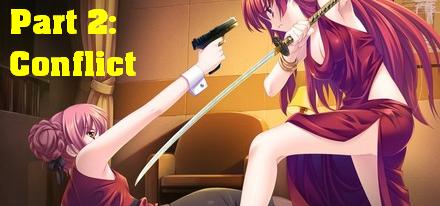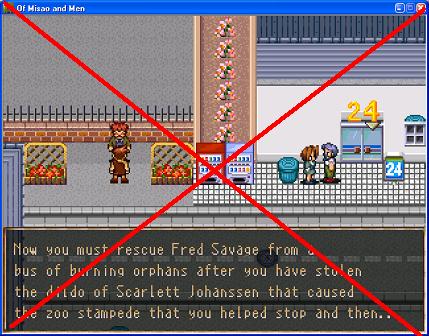GAME DESIGNER'S MANIFESTO: PART TWO (CONFLICT)
In which we look at the various types of conflicts typically found in games, and how to handle them!
 Strangeluv
Strangeluv- 07/21/2010 03:18 AM
- 7270 views

I believe we've established that we are going to try to dare to do something different with our plot now. Suggestions were listed in previous pages, but you want to know exactly what kind of conflicts your plot can have if not saving the world and collecting the teardrops of the moon to defeat big Sun monster.
A writing teacher of mine has been given two metaphors that could explain what is preferred in a plot. The first is identifying the story as a piece of string and tying knots in that piece of string as it goes along. The writer to know where to tie the knots. These knots refer to crises (plural of crisis) in the story. Stories need crises. Stories need trouble. No player is interested in a game where there is no conflict, where there is no trouble and just happiness and everyone gets their jollies.

However, these knots have to be untied at the end of the game. Mind you, this is not a rule because in writing, there are no real rules. But this untying of knots is signified as the denouement , when the crises are over, when the resolution occurs and all the results play off and we see what happens to our characters in the aftermath. Following the denouement is the conclusion, which is basically just the end result of the plot, as stated.
This makes your game so much more memorable in the end than a screen saying "YOU FINISHED THE GAME. CONGRATULATIONS! GJ!" Be fair to your players. They've finished your game, give them a proper ending... if you ever manage to finish your game yourself!

The other metaphor my teacher likened writing to was, well, sexual intercourse . As you go along, you keep going more and more, not reaching that climax yet. You cannot climax at the beginning or the middle but you have to keep putting in more and more energy in there to make the climax better. Remember I said your game is Speed Racer's car and your story is your track? Keep your scenery interesting. A track can get very boring and you have to change that.
You have to entice your players with your plot, almost seduce them to want it badly but keep them satisfied with what they are getting currently. And then the climax comes! And you better hope the reader is pleased with it! And then you lie in bed and smoke a cigarette and this is the denouement - lying in bed and smoking a cigarette and possibly wanting to just cuddle or go to sleep or whatever.
-------------------
So Much Conflict and I'm Not Sure How to Do It
Conflict comes in basically five categories and examples in brackets.
1. Protagonist versus Antagonist (A man wants to do something bad to another or do something that will affect others in a bad way. )

2. Protagonist versus Society (A man wants to go out and solve a problem that is affecting a village.)

3. Protagonist versus Nature (A man has to survive in the jungle.)

4. Protagonist versus Himself. (A man has killed another man and it's tearing him up inside. He must redeem himself somehow.)

-----------------------
/!\ JUST A REMINDER /!\
Remember that conflict is the most important element of a plot. Without it, a plot isn't a plot. It's always important to keep conflict constant, one way or the other. It doesn't always have to be heavy or overbearing, but keeping it constant keeps the player interested in what is going on. I cannot stress this enough.
----------------------
SUGGESTIONS ON CONFLICT:
1. Don't just focus on external conflict. Characters have feelings to. Internal conflicts can be very interesting if they are done well. Not only will this help, this will give your game the heart it needs. Your characters is the energy the player gets most involved with in a game. Don't be afraid to give your character feelings and personalities. Don't be afraid to have them row with each other. What group of people doesn't build tension among themselves? This could be a good tool in building even more conflict. But...
2. For goodness sake, don't overdo it. Keep your conflict constant but as I said, don't drown the story with it. A deluge of conflict is not only awkward but overwhelms the player. Not always, but it's walking a fine line and I would not recommend it. I would also not recommend making your characters super-emotional, but I will write about that later. Keep your conflicts simple (not convoluted), keep them easy for the player to relate to. Don't make them ridiculous or long-winded. This makes it hard to relate to. You want to reel the player in, not push them away.

3. Always try to give your conflict something new, something to differentiate it from other conflicts in other games. If story is the main thing in your game, you want it to be memorable, you want it to stand out. If you're going to do something about saving the world, do it in some innovative way that cannot be superimposed onto a typical lazy plot of beating seven mystical dragons to make your way to the top of the Evil Tower of the Overlord. I can't tell you how to do this. You have to use your own imagination for this one. You have to do some work.
4. Stick with one main conflict, if you can. From where your introduction begins and crisis begins, it should be one main crisis. From start to finish, yes. It can morph and shape itself into different forms but at its bare-boned structure, it should be the same main conflict, the same main goal. The only exception is if there is a sudden twist in the middle of the story and you have to go to a different allegiance, fight for a different cause, blah blah etc. etc. But otherwise, stick with one main conflict. You can always put sub-plots with different conflicts throughout the plot to accompany this one main conflict. But shifting from main conflict to main conflict to main conflict in a plot is tiring.

1. What would a plot be like without conflict?
2. If I had an original conflict or did it in an innovative original way, would my game get better reception?
3. And how would I go about doing this?
4. Would it better for a game to have characters who have internal conflicts as their journey goes on?
5. How much conflict should my game have? How much is too much? How much would tire me out as a player, not a game maker?
EXTRA MATERIAL
Here is a list from George Polti's 36 Dramatic Situations and related character archetypes that could help you think up some conflicts:
1. Supplication
* a Persecutor; a Supplicant; a Power in authority, whose decision is doubtful.
2. Deliverance
* an Unfortunate; a Threatener; a Rescuer
3. Crime pursued by vengeance
* an Avenger; a Criminal
4. Vengeance taken for kin upon kin
* an Avenging Kinsman; Guilty Kinsman; remembrance of the Victim, a relative of both
5. Pursuit
* Punishment; a Fugitive
6. Disaster
* a Vanquished Power; a Victorious Enemy or a Messenger
7. Falling prey to cruelty/misfortune
* an Unfortunate; a Master or a Misfortune
8. Revolt
* a Tyrant; a Conspirator
9. Daring enterprise
* a Bold Leader; an Object; an Adversary
10. Abduction
* an Abductor; the Abducted; a Guardian
11. The enigma
* an Interrogator; a Seeker; a Problem
12. Obtaining
* (a Solicitor & an Adversary who is refusing) or (an Arbitrator & Opposing Parties)
13. Enmity of kin
* a Malevolent Kinsman; a Hatred or a reciprocally-hating Kinsman
14. Rivalry of kin
* the Preferred Kinsman; the Rejected Kinsman; the Object of Rivalry
15. Murderous adultery
* two Adulterers; a Betrayed Spouse
16. Madness
* a Madman; a Victim
17. Fatal imprudence
* the Imprudent; a Victim or an Object Lost
18. Involuntary crimes of love
* a Lover; a Beloved; a Revealer
19. Slaying of kin unrecognized
* the Slayer; an Unrecognized Victim
20. Self-sacrifice for an ideal
* a Hero; an Ideal; a Creditor or a Person/Thing sacrificed
21. Self-sacrifice for kin
* a Hero; a Kinsman; a Creditor or a Person/Thing sacrificed
22. All sacrificed for passion
* a Lover; an Object of fatal Passion; the Person/Thing sacrificed
23. Necessity of sacrificing loved ones
* a Hero; a Beloved Victim; the Necessity for the Sacrifice
24. Rivalry of superior v. inferior
* a Superior Rival; an Inferior Rival; the Object of Rivalry
25. Adultery
* two Adulterers; a Deceived Spouse
26. Crimes of love
* a Lover; the Beloved
27. Discovery of the dishonour of a loved one
* a Discoverer; the Guilty One
28. Obstacles to love
* two Lovers; an Obstacle
29. An enemy loved
* a Lover; the Beloved Enemy; the Hater
30. Ambition
* an Ambitious Person; a Thing Coveted; an Adversary
31. Conflict with a god
* a Mortal; an Immortal
32. Mistaken jealousy
* a Jealous One; an Object of whose Possession He is Jealous; a Supposed Accomplice; a Cause or an Author of the Mistake
33. Erroneous judgement
* a Mistaken One; a Victim of the Mistake; a Cause or Author of the Mistake; the Guilty One
34. Remorse
* a Culprit; a Victim or the Sin; an Interrogator
35. Recovery of a lost one
* a Seeker; the One Found
36. Loss of loved ones
* a Kinsman Slain; a Kinsman Spectator; an Executioner
Stay tuned for the third article in the Game Designer's Manifesto series: CUTSCENES, FOCUS, MOOD AND THEME!
Posts 

Pages:
1
Pages:
1















